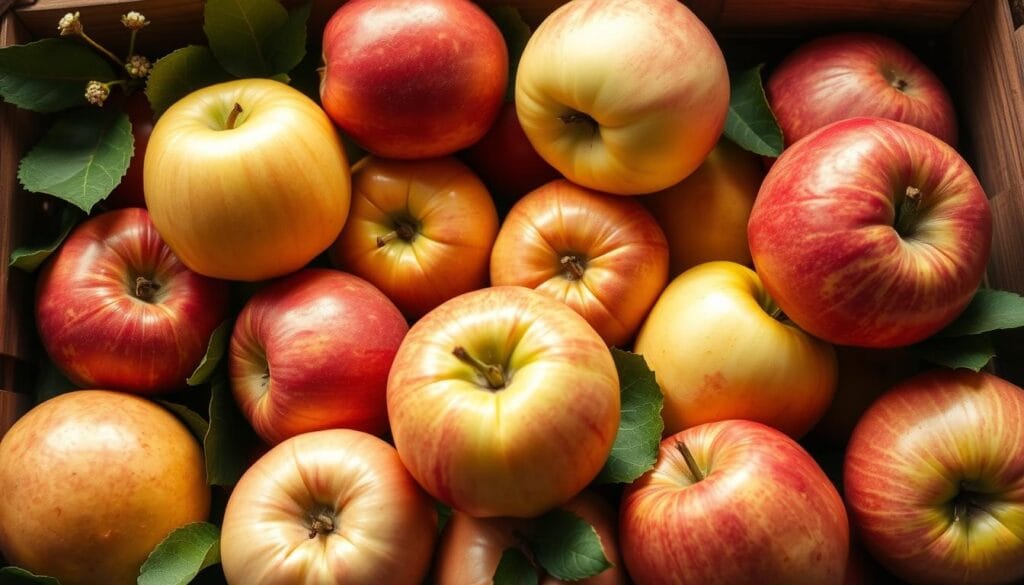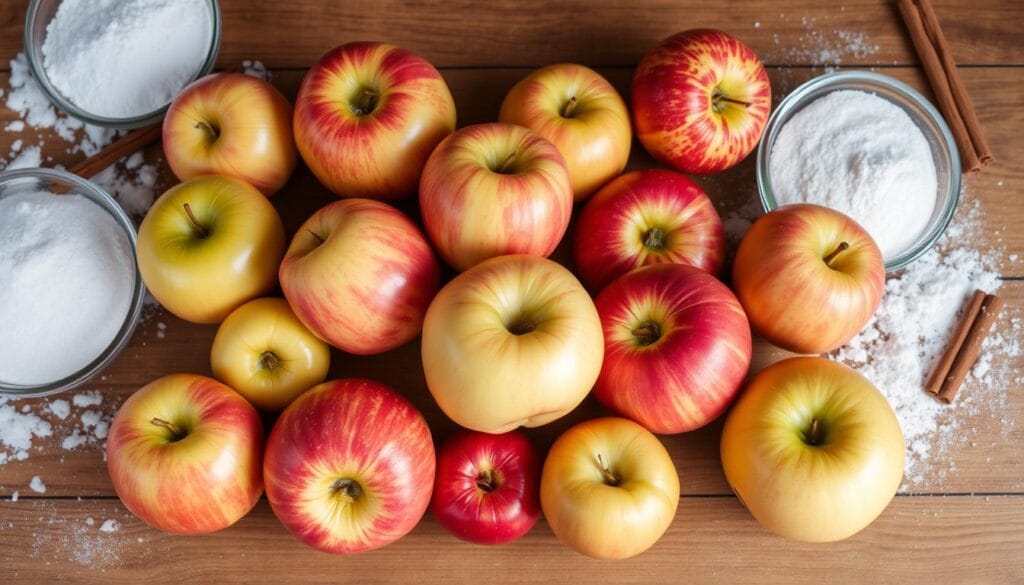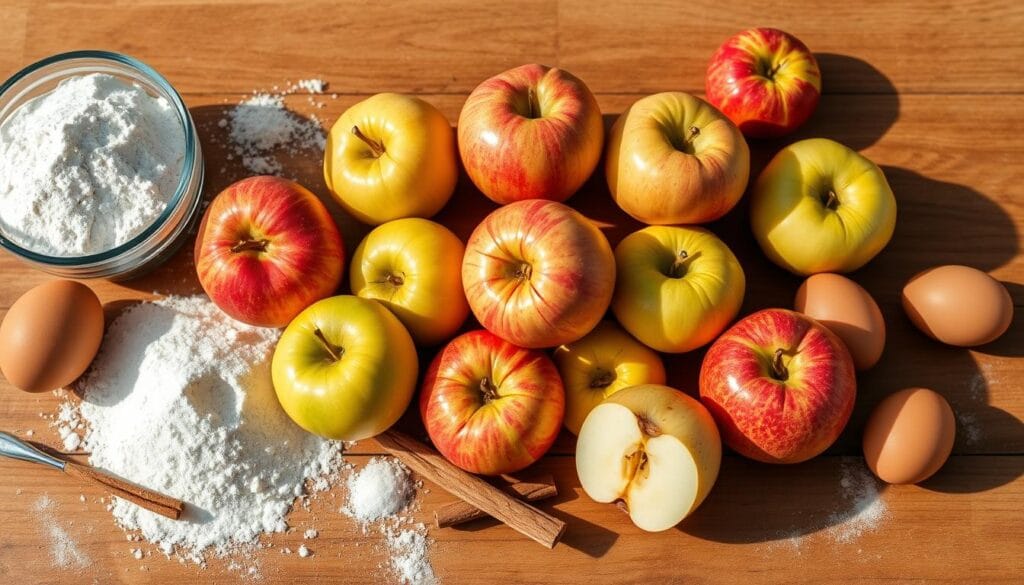Ever wondered why some apple cake are heavenly while others aren’t? The secret is choosing the right apple. Baking with apples is an art that turns simple ingredients into a memorable dessert.
When picking the best apple for cake, think beyond flavor. Texture, moisture, and sugar levels matter too. For example, recipes like One-Bowl Apple Cake demonstrate how the right apple choice can elevate a simple dessert.
Imagine a slice of cake that’s perfectly tart and sweet. That’s what happens when you pick the right apple. For cost-conscious bakers, Passionate Penny Pincher Recipes offers ideas to make high-quality bakes without breaking the bank.
Professional bakers know apples vary. Some keep their shape, while others become soft. Your choice depends on the recipe and the texture you want. To source premium apples and other ingredients, explore Trader Joe’s Recipes for inspiration.
In this guide, we’ll dive into the world of apple selection for cake baking. For precise baking techniques, consider tips from how to make cake pops without the chocolate cracking. You’ll learn how to choose the best apples, cutting techniques, and the science behind the perfect apple cake. It will impress everyone.
Understanding Apple Types for Baking Success

Choosing the right apple varieties is key to baking a perfect apple cake. Knowing the unique traits of different apples helps your recipes shine. It’s all about understanding how each apple variety performs in your baking.
Sweet vs. Tart Varieties
Apples for baking fall into two main categories: sweet and tart. Sweet apples like Fuji and Golden Delicious add a rich, indulgent taste to your cakes. Tart apples, such as Granny Smith, offer a tangy contrast that balances the sweetness.
- Sweet Apples: Fuji, Golden Delicious, Honeycrisp
- Tart Apples: Granny Smith, Braeburn, Pink Lady
Texture Considerations
The texture of apples is vital in baking. Some apples stay firm, while others soften more. For a cake with chunky apple pieces, use firmer apples like Honeycrisp or Granny Smith. McIntosh or Cortland apples are great for a more blended texture.
Seasonal Availability
Seasonal availability is another factor to consider. Apples peak at different times, affecting flavor and texture. Local farmers markets and orchards are great for finding fresh, perfect apples for your baking.
Pro tip: Mixing sweet and tart apples can create a complex, balanced flavor in your cakes.
What is the best apple to use in a cake?
Choosing the right apple for your cake can make a big difference. It can turn a simple dessert into a special treat. The perfect apple variety is key for great flavor and texture.

Each apple variety adds its own special touch to your baking. The best apples keep their shape and offer a sweet and tangy taste.
Top Apple Varieties for Cake Baking
- Granny Smith: The gold standard for baking apples
- Honeycrisp: Offers perfect balance of sweetness and crispness
- Braeburn: Excellent for maintaining shape during baking
- Pink Lady: Provides a complex flavor profile
- Fuji: Adds natural sweetness to your apple cake ingredients
Experts say mixing two or three apple types makes the cake taste even better. This way, you get a mix of flavors from different apples.
Apple Selection Characteristics
| Apple Variety | Flavor Profile | Baking Performance |
|---|---|---|
| Granny Smith | Tart and crisp | Holds shape perfectly |
| Honeycrisp | Sweet with slight tartness | Maintains texture well |
| Braeburn | Balanced sweet-tart | Minimal breakdown during baking |
When picking apples for your cake, think about their moisture, sugar, and baking ability. Your choice greatly affects the cake’s taste and texture.
The Science Behind Apple Selection for Cakes
Knowing about apple baking science is key to making the perfect cake. The right apple can make your baking go from good to great. It does this by balancing moisture, sugar, and pectin content.

When picking apples for cake, it’s important to understand their unique traits. The molecular makeup of apples greatly affects your cake’s texture and taste.
Moisture Content Impact
Moisture in apples affects your cake’s texture. Apples with a lot of water can make your cake soggy. On the other hand, drier apples help keep your cake firm.
- Check the apple’s water percentage before baking
- Pick apples with balanced moisture levels
- Pre-treat apples to cut down on excess liquid
Sugar Levels and Baking Performance
The sugar in apples changes your cake’s sweetness and how it caramelizes. Different apples have different sugar levels. This can make your baking better or worse.
| Apple Variety | Sugar Content | Baking Performance |
|---|---|---|
| Honeycrisp | 10-14% sugar | Excellent balanced sweetness |
| Granny Smith | 7-10% sugar | Tart, great for complex flavors |
| Fuji | 14-16% sugar | Very sweet, caramelizes well |
Pectin Content and Structure
Pectin in apples helps thicken your cake. Knowing about pectin levels helps you understand how apples will behave in the oven. Apples with more pectin make cakes that are more stable and structured.
By learning these scientific tips, you’ll become a more skilled and creative baker. You’ll choose apples that perfectly match your cake recipe.
Popular Apple Varieties for Different Cake Styles
Choosing the right apple variety can make your cake amazing. Each apple variety has its own traits that fit different cake styles. Knowing which apples are best for each recipe can take your baking to the next level.
- Firmness of the apple
- Sugar content
- Moisture levels
- Flavor intensity
For moist, dense apple cakes, firmer apples are best. Granny Smith and Honeycrisp are great for keeping cakes moist and firm.
| Cake Style | Recommended Apple Varieties | Flavor Profile |
|---|---|---|
| Pound Cake | Granny Smith, Honeycrisp | Tart, firm texture |
| Spiced Cake | Pink Lady, Braeburn | Balanced sweetness |
| Light Sponge Cake | Fuji, Golden Delicious | Sweet, delicate flavor |
Popular apples for baking include Gala, Jonagold, and Braeburn. Each has special qualities that can improve your cake. The apple you choose can change your cake’s taste and texture a lot.
Pro tip: Try mixing apple varieties for a richer flavor. Experiment with different mixes to find your favorite apple cake!
Preparing Apples for Your Cake Recipe
Starting with the right apple prep is key to a great cake. Learning how to cut, treat, and store apples can make a big difference in your baking.
Apple prep for baking is an art. It involves several important steps to make your cake delicious and textured just right.
Cutting Techniques for Apple Cake
When cutting apples for cake, precision is crucial. Here are the essential steps:
- Use a sharp chef’s knife for clean cuts
- Peel apples completely to prevent tough skin in your cake
- Cut apples into uniform 1/4-inch thick slices
- Remove the core before slicing to ensure even pieces
Pre-Treatment Methods
Preventing apple browning is key for a cake that looks as good as it tastes. Lemon juice is your secret weapon in apple prep. Toss sliced apples in fresh lemon juice to:
- Stop oxidation
- Preserve apple color
- Add a subtle tangy flavor
Smart Storage Tips
Storing apples for baking needs careful attention. Here’s how to keep them fresh:
- Store at 32-40°F in the refrigerator
- Use perforated plastic bags to maintain humidity
- Keep apples away from other produce to prevent premature ripening
- Use within 4-6 weeks for best quality
Mastering these apple prep techniques will take your cake from good to amazing.
Mixing Different Apple Varieties in One Cake
Making multi-apple cakes is a fun adventure in flavors. By mixing apples, you can create a dessert that’s both complex and exciting. It will surprise your taste buds with its unique flavors.
When you’re picking apples for your cake, try these pairings:
- Tart Granny Smith with sweet Honeycrisp
- Firm Braeburn mixed with soft Golden Delicious
- Crisp Fuji combined with tangy Pink Lady
The secret to great multi-apple cakes is finding the right mix. Some apples are tart, while others are sweet. They all add something special to your cake.
| Apple Variety | Flavor Profile | Best Use in Cake |
|---|---|---|
| Granny Smith | Tart and Firm | Provides Structure |
| Honeycrisp | Sweet and Crisp | Adds Sweetness |
| Golden Delicious | Mild and Soft | Creates Moisture |
For the best taste, mix 2-3 apples together. Try different textures and tastes to find your favorite mix! Your cake will go from good to amazing with these unique apple combinations.
Common Apple Baking Mistakes to Avoid
Baking the perfect apple cake needs precision and attention to detail. Knowing common mistakes can help you make a delicious dessert every time.
Apple Selection Mistakes
Choosing the right apples is key for a great apple cake. Mistakes in apple selection can affect the cake’s texture and taste. Here are some common errors to avoid:
- Selecting overly soft or mealy apples that break down during baking
- Using apples with high water content that create a soggy cake
- Mixing incompatible apple varieties that clash in texture
Preparation Pitfalls
Proper apple preparation is essential for a good apple cake. Be careful of these preparation mistakes:
- Inconsistent apple slicing that leads to uneven baking
- Neglecting to remove seeds and stems
- Failing to pat apples dry before adding to batter
Storage and Handling Mistakes
Incorrect storage and handling of apples can ruin your baking. Remember these tips:
- Storing apples at room temperature for extended periods
- Using overripe apples that release excess moisture
- Not refrigerating apples to maintain their firmness
Avoiding these common mistakes will help you make a delicious apple cake. It will impress everyone at the table.
Regional Apple Availability and Substitutions
Finding the right apples for baking can be hard. The United States has many local apple varieties. Each region has its own apples that can change how your cake turns out.
If you can’t find the apples you need, finding substitutes is key. Every area grows different apples. So, your local market might not have what your recipe calls for.
Regional Apple Availability Guide
| Region | Best Local Apple Varieties | Recommended Substitutes |
|---|---|---|
| Northeast | Macoun, Northern Spy | Cortland, Empire |
| Midwest | Honeycrisp, Jonagold | Golden Delicious, Gala |
| Pacific Northwest | Gravenstein, Pink Lady | Fuji, Braeburn |
When looking for apple substitutes, focus on these things:
- Sweetness level
- Tartness profile
- Texture when baked
- Moisture content
Pro tip: Local farmers markets often provide the best insight into regional apple varieties. Talking to local growers can help you discover hidden gem apples perfect for your cake recipes.
Remember, the season affects apple availability. Some apples are only in season for a few months. So, plan your baking with the seasons in mind.
Conclusion
Choosing the right apple for cake is an art that makes desserts special. It’s important to know each apple’s unique taste. Granny Smith and Honeycrisp apples add special flavors to your cake.
Try different apples to find your favorite cake recipe. Braeburn, Fuji, and Pink Lady apples add unique textures and tastes. Mixing Granny Smith’s tartness with Fuji’s sweetness creates a perfect flavor.
But making great apple cake is more than picking the right fruit. Think about the apple’s firmness, sugar, and how it cooks. Being open to trying new things will help you make cakes that are both tasty and beautiful.
With time and curiosity, you’ll get better at baking with apples. Start with the best apples, learn their benefits, and be creative. Your dream apple for cake is out there, waiting for you to find it.
2 thoughts on “Find the Perfect Apple for Your Cake”